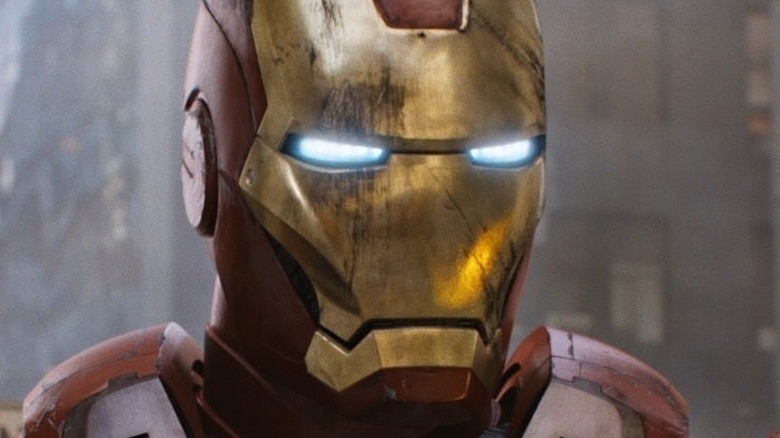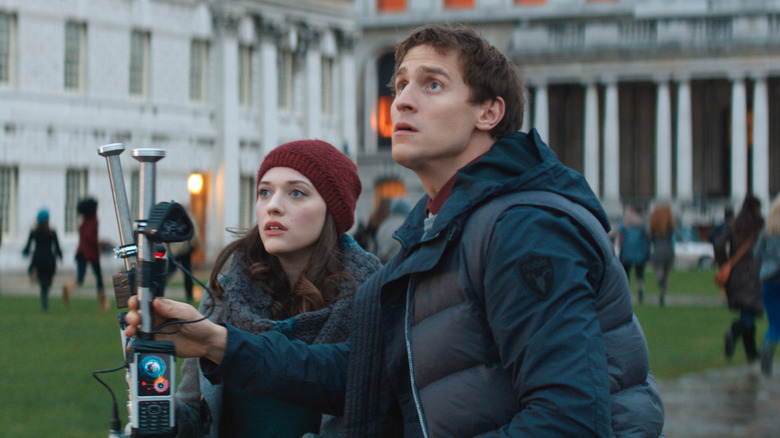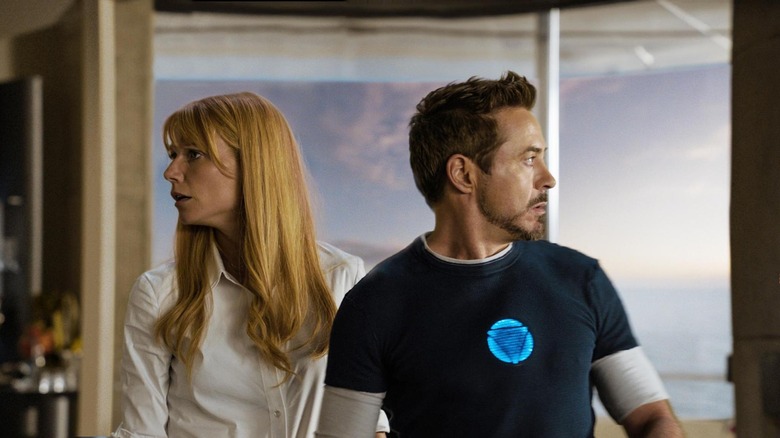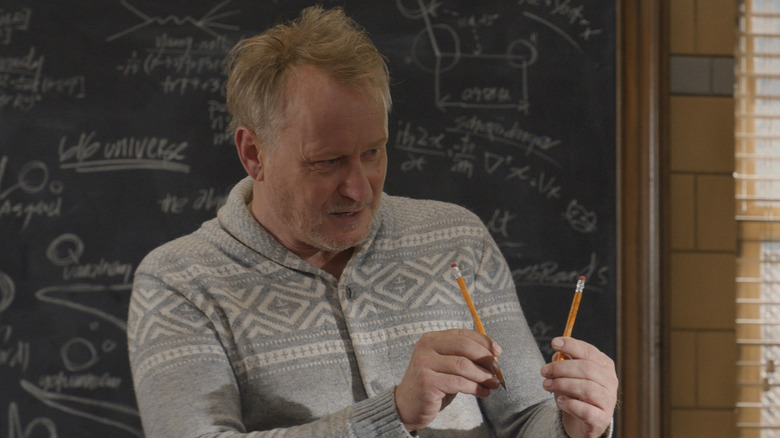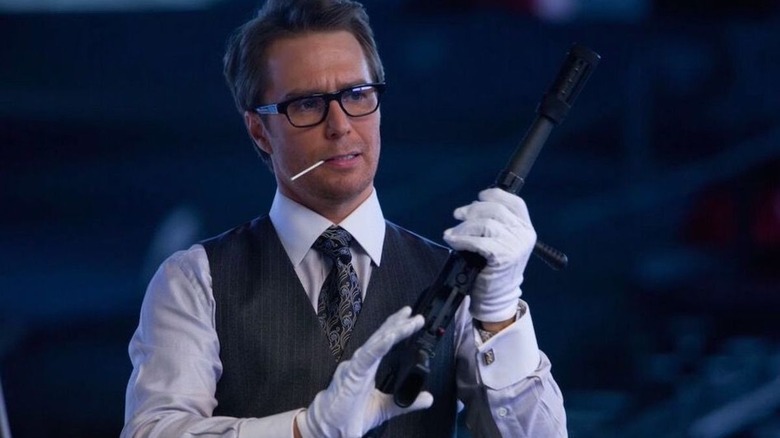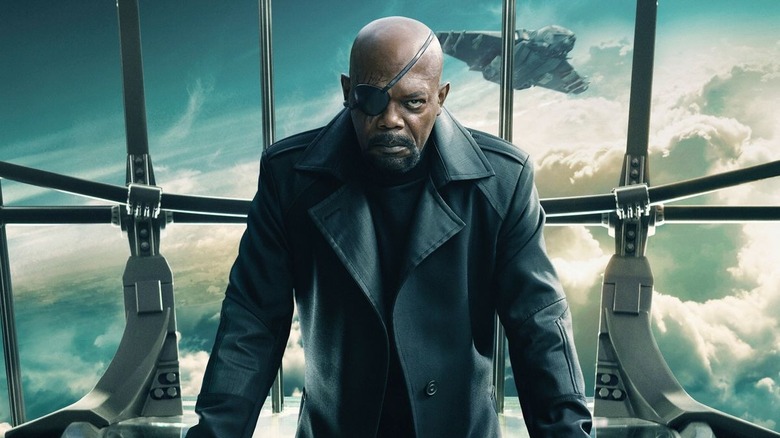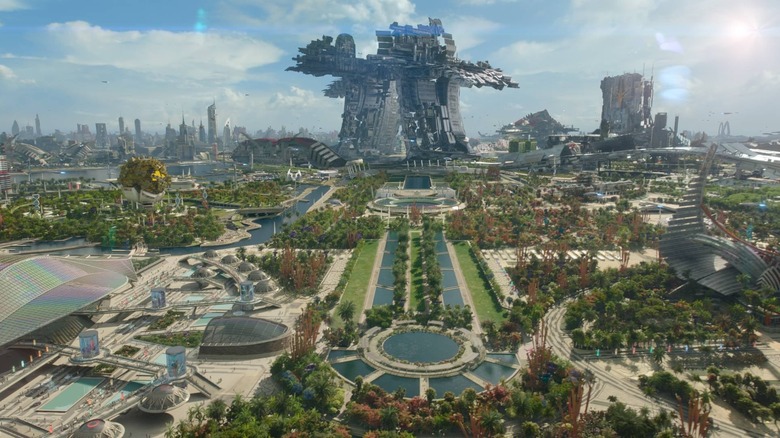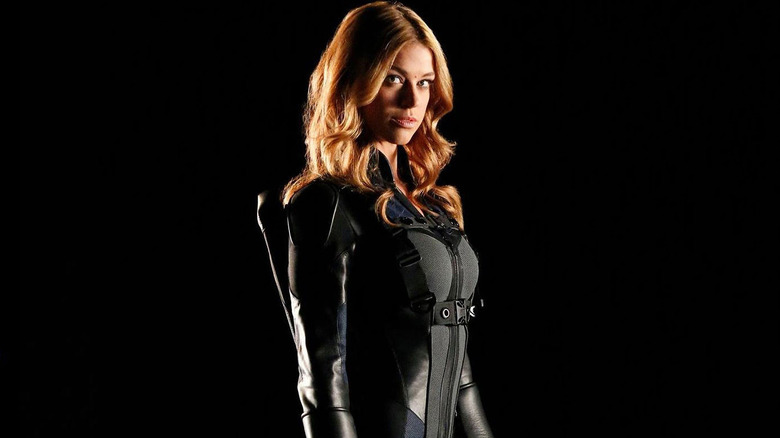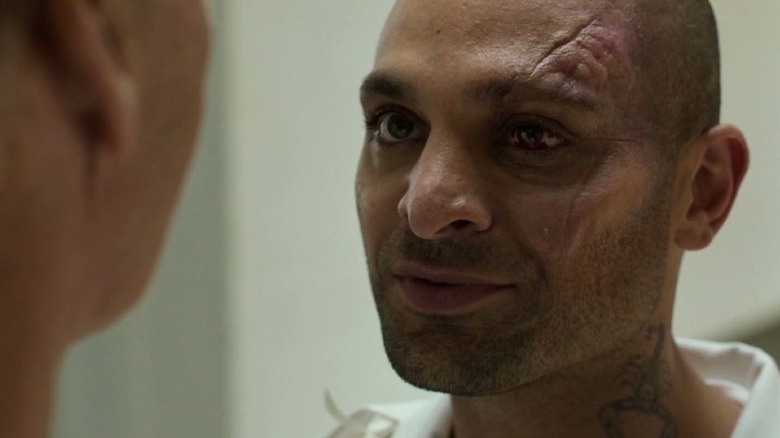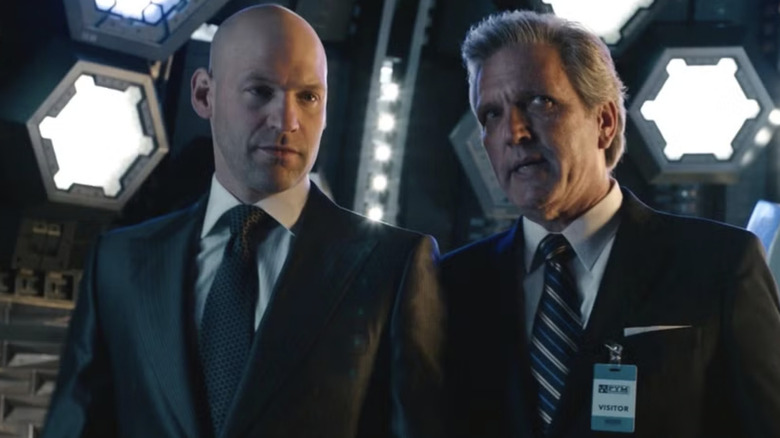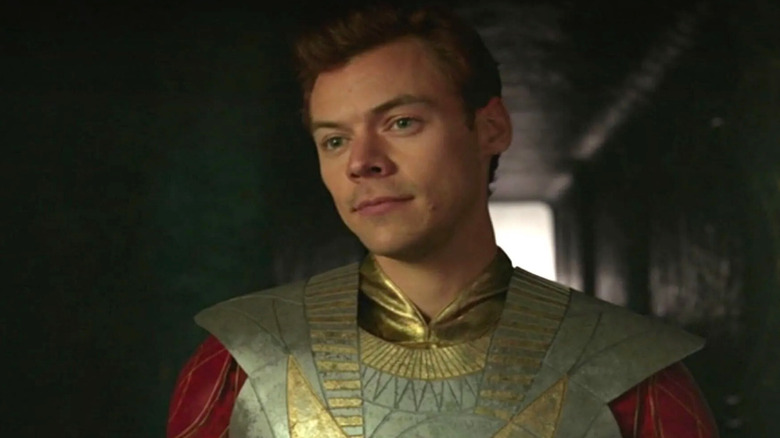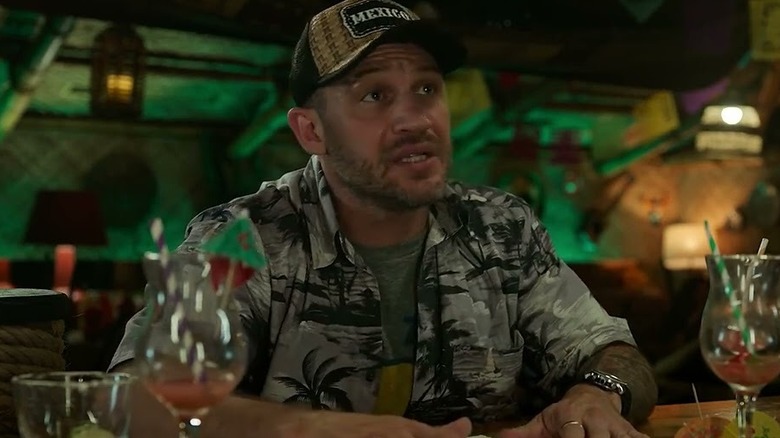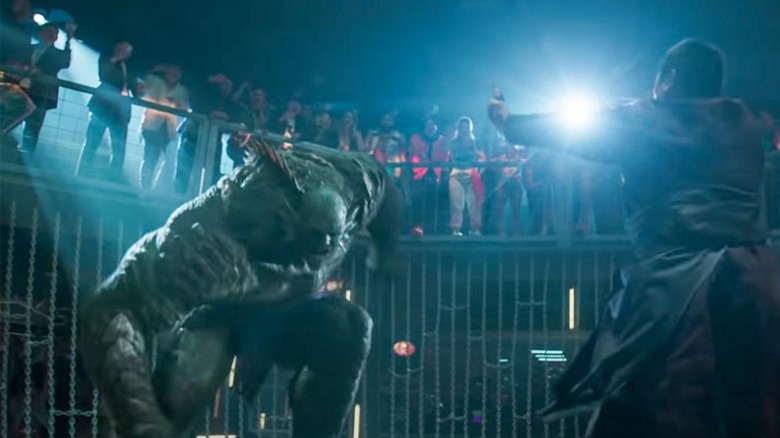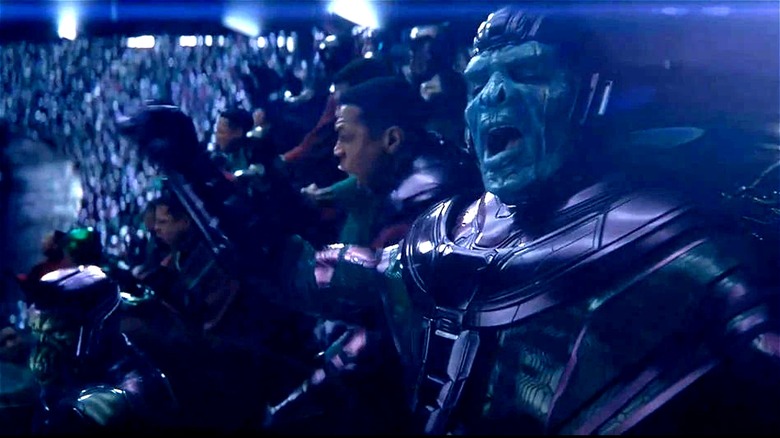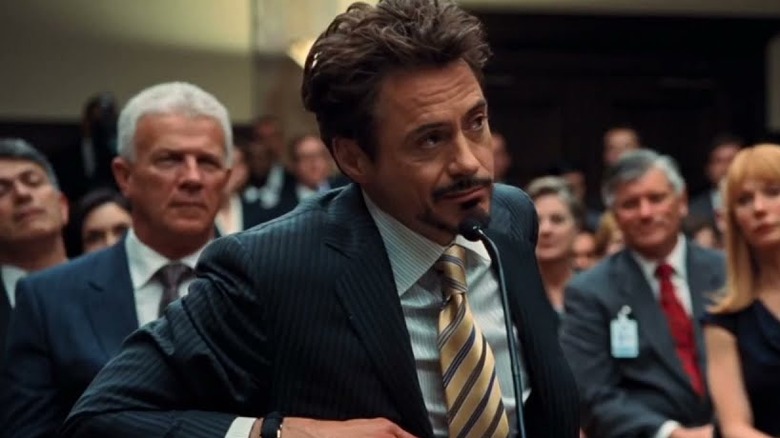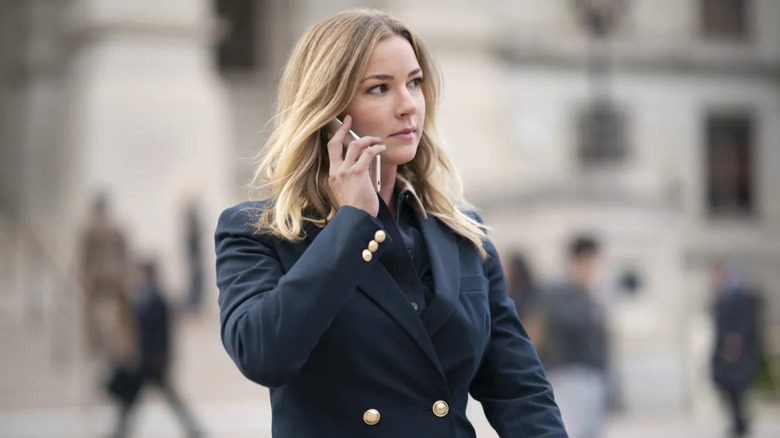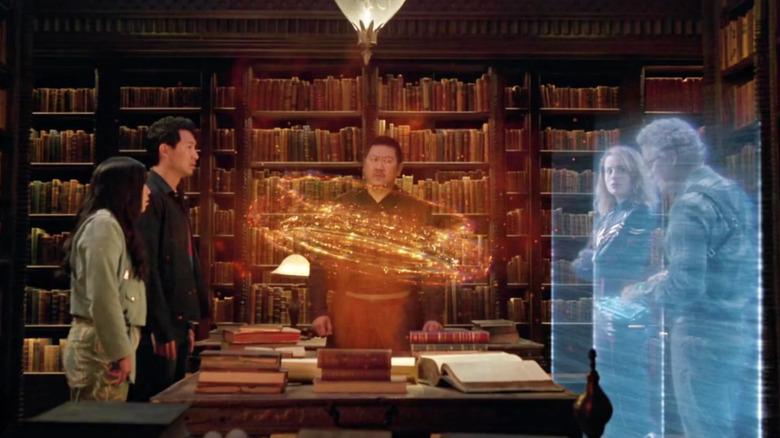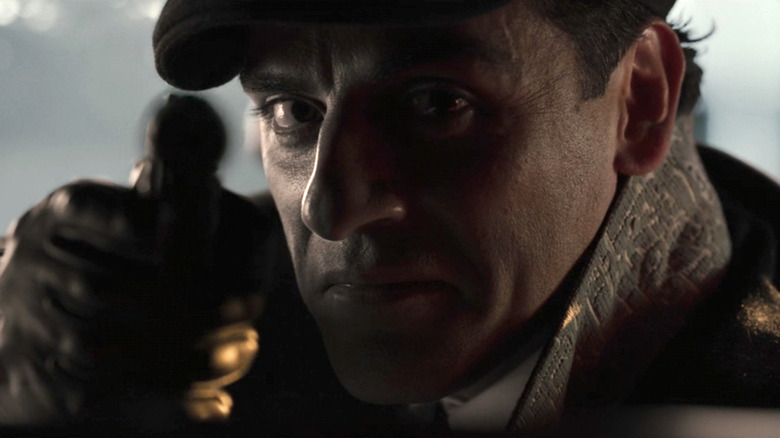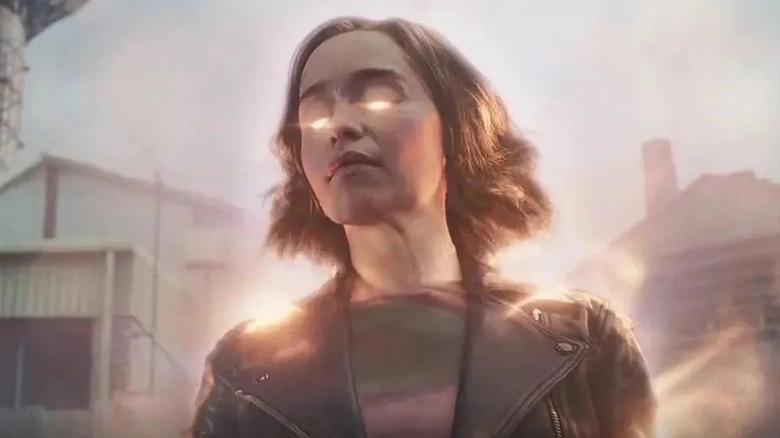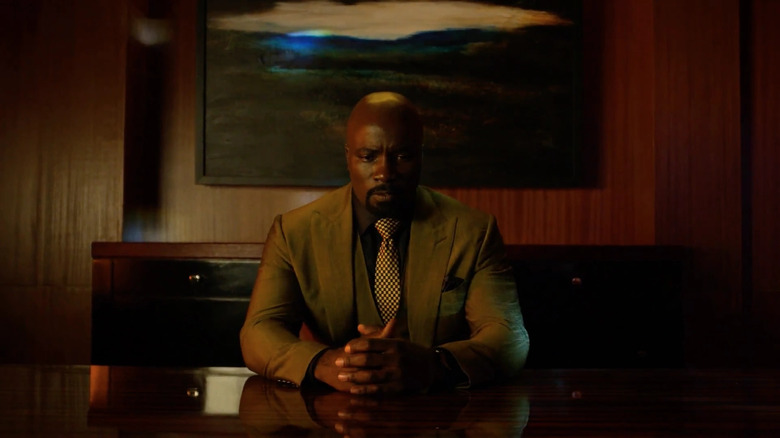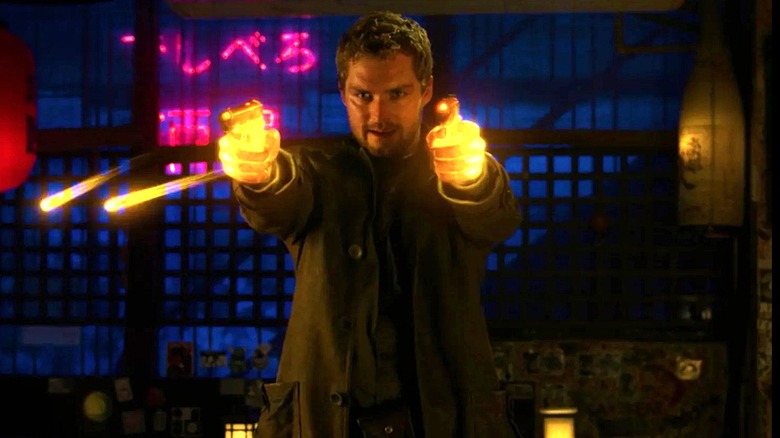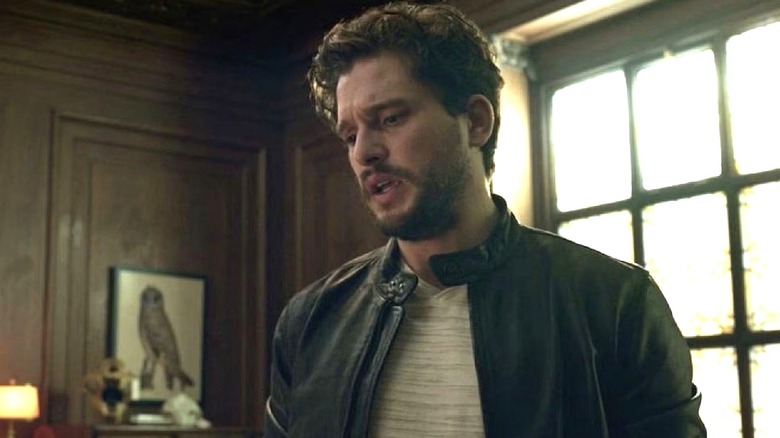MCU Storylines That Disappeared Without Explanation
Part of what makes the Marvel Cinematic Universe so much fun is how plotlines can not only expand over multiple movies but get satisfying pay-offs. Just look at the journey of Captain America, which spanned nearly a decade and ended on an emotionally affecting note that brought his story back to the woman he loved. Ditto the saga of Iron Man, which saw a man who once cared only for himself sacrificing his life to save all of existence. The way these plotlines can breathe over years and years makes their resolutions all the more gratifying. But that doesn't mean that every single storyline in the MCU has gotten a proper ending.
In fact, several storylines in this expansive franchise have ended up just fizzling out entirely despite being tailor-made for exciting continuations. Everything from teases of famous supervillains to seemingly critical relationships centered around certain superheroes has gotten shockingly little in the way of concrete resolution. The reasons are varied for why a franchise that prides itself on offering up cathartic resolutions of existing plotlines would abandon these narrative threads. In some cases, it's due to a sequel not getting made while other stories have fallen victim to the MCU's narrative focus shifting to other priorities. Whatever caused these plotlines to remain unresolved, they now stick out like a sore thumb in the Marvel Cinematic Universe.
Darcy and Ian's romance in Thor: The Dark World
In "Thor: The Dark World," a comic relief character got her own comic relief sidekick. Darcy Lewis (Kat Dennings), Jane Foster's humorous intern from the first "Thor" film, got an assistant to help her lug things around in the form of Ian Boothby (Jonathan Howard). The two have a mildly conflict-ridden dynamic throughout the adventure before abruptly kissing during the invasion of London by the Dark Elves.
Despite being around for so much of "Thor: The Dark World," Ian didn't possess much in the way of personality. He was just another Earthbound human who delivered small quips and was ill-equipped to deal with all things superheroic. There wasn't even much chemistry between him and Dennings, romantic or otherwise. He wasn't painfully irritating — just not all that memorable.
Ian's role in the MCU was extremely short-lived. He, like all of Thor's Earthbound cohorts, did not return for "Thor: Ragnarok." In the years since, however, Jane Foster (Natalie Portman) managed to land a comeback in "Thor: Love and Thunder" while Darcy returned in "WandaVision" as a full-fledged doctor. Yet Darcy made no mention of Ian despite the two locking lips during the climax of "The Dark World." Their romance, and the character of Ian altogether, was just not meant to last very long in this franchise.
Pepper Potts and Tony Stark taking a break
In the middle of "Captain America: Civil War," Tony Stark (Robert Downey Jr.) drops a bombshell on Steve Rogers (Chris Evans): he and Pepper Potts (Gwyneth Paltrow) are taking a break. After the character was absent from "Avengers: Age of Ultron" due to her duties to Stark Industries, this confirmed that Stark was officially single again, thanks in part to his non-stop adventures with the Avengers. Stark's wealth would make it seem like he could have anything at his fingertips but he couldn't keep the woman he loved around.
It was a significant development that played into the darker headspace that Stark occupied in "Civil War" and explained why he felt the need to embrace the Sokovia Accords so he could protect the loved ones he still had. It also helped explain why Potts was suddenly M.I.A. from the franchise.
But this development was abruptly upended in "Spider-Man: Homecoming," when Pepper Potts not only reappeared but was being intimate with Stark as if nothing had ever happened. There was even a gag about Stark popping the question to Potts in lieu of introducing Spider-Man in his Iron Spider outfit to members of the press. The sudden loss of Potts in Stark's life never got referenced in the following two "Avengers" movies either, making this a strange, unexplained detour in the love lives of two principal MCU figures.
Erik Selvig's psychological problems
In the wake of "The Avengers," "Thor: The Dark World" finds scientist Erik Selvig, one of the few Marvel characters created specifically for the MCU, struggling to maintain a proper psychological state. Having had Loki control his mind for an extended period of time, Selvig is now prone to bouts of strange behavior, like wandering around Stonehenge naked. He's even been locked up in a psych ward, which Darcy and Ian must break him out of to assist Thor in his quest to defeat the Dark Elves. It's a story development that doesn't work on a comedy level (too many gags making fun of mental impairments), but it does provide an interesting way of making sure the events of "The Avengers" don't just disappear.
The lingering aftereffects of Selvig getting his brain scrambled in "The Avengers" wouldn't last forever, however. When Thor went to recruit the man's help in "Age of Ultron," Selvig was seen walking out of a college where he teaches. Not only had he returned to his regular day job, but there was no indication of him having any psychological trauma to parse out. Any attempt to establish a lasting impact from the events of the first "Avengers" was eventually ignored, as seen by how quickly Selvig recovered after "The Dark World."
Justin Hammer vowing revenge at the end of Iron Man 2
At the end of "Iron Man 2," weapons manufacturer Justin Hammer (Sam Rockwell), after giving away valuable information about Ivan Vanko's (Mickey Rourke) big evil plan, is arrested by police officers. After initially resisting, Hammer is finally carted away by law enforcement. As this happens, he tells Pepper Potts that this isn't over and that he'll be getting his revenge sooner rather than later. Perhaps that was originally the plan; MCU films don't let just any villain remain alive and well, after all. The decision to keep Hammer alive and thirsting for vengeance had to have been made to set up future installments.
However, for whatever reason, Hammer has not re-emerged in the MCU. "Iron Man 3" had no place for Hammer while other movies starring Tony Stark, like "Captain America: Civil War," also found no room for him. The most peculiar part of this is that Rockwell's profile has increased substantially since "Iron Man 2" came out. Having won a Best Supporting Actor Academy Award and getting another Oscar nod in the same category, one would think Marvel Studios would be scrambling to bring him back. Instead, Rockwell's entire presence in this franchise has been limited to "Iron Man 2" and a tiny cameo in the short film "All Hail the King."
Nick Fury going rogue at the end of The Winter Soldier
"Captain America: The Winter Soldier" ends with a genuinely nifty beat; Nick Fury opts to remain dead. After faking his death earlier in the film, one would expect Fury to just return to his regular day-to-day duties by the end of the feature. Instead, the superspy makes the conscious choice to remain deceased as far as the general public knows. The viewer even gets a glimpse at his headstone, located in a Washington D.C. cemetery. As Fury walks off-screen in "The Winter Soldier," the possibilities for what he could be up to next are limitless.
Strangely enough, "Age of Ultron" brings things right back to their original status quo. While Fury is initially depicted as someone who's been off the grid for a while, he's ultimately shown manning a Helicarrier in his traditional leather garb to help Sokovian civilians get to safety. Rather than a shadowy individual believed to be dead by most, Fury is once again a public figure that everyone knows is alive and well. It's a strange move that undercuts the ending of "The Winter Soldier" and all the narrative possibilities that Fury remaining dead could have brought.
Everything related to the planet Xandar
In the original "Guardians of the Galaxy" movie, Xandar is an important planet. It's where four of the five titular superheroes meet up, as well as home to the headquarters of the Nova Corps organization and the backdrop for Ronan the Accuser's massive final battle to execute his vengeance against the planet's occupants.
Given all that and the fact that it housed an Infinity Stone at the end of "Guardians of the Galaxy," fans might expect such a location and its characters, including Nova Prime (Glenn Close) and Rhomann Dey (John C. Reilly), to reappear throughout future MCU adventures, particularly cosmic-based ones.
Instead, the planet hasn't reappeared at all in subsequent films. The Nova Corps gets name-dropped in "Guardians of the Galaxy Vol. 2," and Xandar is mentioned in "Thor: Ragnarok" and "Avengers: Infinity War." That's the extent to which the planet has factored into the franchise post-"Guardians of the Galaxy," with even its destruction as Thanos procured its Infinity Stone happening entirely off-screen. Xandar started as a seemingly important place, but it's been largely brushed aside in the mythology of the Marvel Cinematic Universe.
The fate of Bobbi Morse
Starting with the show's second season, Bobbi Morse/Mockingbird (Adrianne Palicki) was a critical part of "Agents of S.H.I.E.L.D." and its ever-expanding mythology. However, she and her love interest Lance Hunter eventually left "S.H.I.E.L.D." in the third season episode "Parting Shot." In-universe, this was because the duo would be more dangerous to their S.H.I.E.L.D. comrades if they stuck around — they were forced to leave to keep Coulson and company safe. However, beyond these fictitious confines, Morse's sudden absence was devised to allow herself and Hunter to headline a spin-off show titled "Marvel's Most Wanted."
However, those plans hit a snag once ABC opted to pass on "Most Wanted," leaving the two characters in a state of limbo. Suddenly, it was unclear how and where Morse fit into the MCU, and the two failed to return to "Agents of S.H.I.E.L.D." as series regulars even after "Most Wanted" went belly up. Though Hunter managed to pop up in a guest appearance capacity in a later episode of "S.H.I.E.L.D.," Morse remained M.I.A. for the rest of the program's run. Part of this appears to be due to scheduling conflicts for Palicki, who eventually found a lead role on the Fox sci-fi series "The Orville." However, no official reason has ever been given for her sudden departure. Whatever caused the character's absence, a hole was left in the "Agents of S.H.I.E.L.D." mythology that kept all storylines related to Morse awkwardly unresolved.
The Scorpion's thirst for revenge
In the middle of "Spider-Man: Homecoming," the young webcrawler's inexperience with properly handling criminals is made apparent through the bungling of his attempt to stop a weapons sale on a ferry. This transaction involves the henchman of the film's primary villain, Adrian Toomes/The Vulture (Michael Keaton), but it also entails Mac Gargan (Michael Mando) a criminal who, in the comics, is also known as the supervillain the Scorpion. Here, Gargan is depicted as just a person (albeit one with a scorpion tattoo on his neck) who quickly vanishes in the chaos of Spider-Man's botched attempt to stop a crime.
The mid-credits scene of "Homecoming," in which a battered and vengeful Gargan confronts Toomes in prison and asks if he knows the secret identity of Spider-Man, seemed to be setting up the idea of the latter as a recurring threat to Spider-Man. However, Gargan has made no further appearances in either the live-action Spider-Man films or other Sony/Marvel productions like "Venom," and a rumored presence in the feature "Silver and Black" went nowhere once that film got canned in pre-production. While Gargan was useful in showcasing Spidey's inexperience in "Homecoming," the seeming lack of interest in further exploring the character indicates his usefulness in the MCU may have come to a close.
What did HYDRA do with those Pym particles?
The evil organization known as HYDRA first popped up in the MCU in "Captain America: The First Avenger," led by the infamous Red Skull (Hugo Weaving). Though defeated, they lived on, and in "Captain America: The Winter Soldier," we learn that they went underground and infiltrated the highest levels of government, including the clandestine intelligence agency known as S.H.I.E.L.D. Even after being defeated a second time, HYDRA turned up once more in "Ant-Man," where the villainous Darren Cross hoped to sell them Hank Pym's shrinking tech.
At the climax of the 2015 film, Cross does manage to get a bunch of Pym Particles — the critical element that powers the size-changing — into the hands of a HYDRA agent who runs off, never to be seen again. It's likely this was laying the groundwork for a future story, whether in an "Ant-Man" sequel or another MCU film. Unfortunately, nothing was mentioned in either of the two "Ant-Man" follow-ups, nor did they turn up anywhere we've seen HYDRA since then, like "Agents of S.H.I.E.L.D." or "Captain America: Civil War."
While it's possible there was a storyline for the stolen Pym Particles that Marvel abandoned, "Ant-Man" director Peyton Reed revealed that the film's original ending saw Scott Lang retrieving them before the decision was made to nix the scene and leave the plot thread dangling. Whether Marvel will follow that thread more than a decade later remains to be seen.
Eros goes missing in action
While "Guardians of the Galaxy" may have been the MCU's biggest risk as the franchise's first space-based adventure, "Eternals" was easily the studio's most ambitious project. Headlined by major stars like Angelina Jolie, Salma Hayek, Barry Keoghan, and Kumail Nanjiani, its story changed the very nature of the MCU. Introducing an ancient race of superpowered beings who've been on Earth for millennia, "Eternals" opened up a Pandora's box of story possibilities. But when it crashed and burned at the box office — earning the studio's lowest Rotten Tomatoes score to that point thanks to a critical drubbing — it put the kibosh on just about every plot thread it left dangling.
It took four years to get any real follow-up on Arishem — the Celestial poking out of the Indian Ocean — but it's the movie's post-credits stingers that might never get a conclusion. This is despite both of them featuring superstars making their MCU debuts, most famously when actor and musician Harry Styles shocked audiences by showing up as Eros (aka Starfox, brother of Thanos), who arrives for a single scene alongside the diminutive cosmic hero, Pip (played by comedian Patton Oswalt).
Surely, with such big names attached, there must have been plans in place for them, most likely in an "Eternals" sequel. But with no such film forthcoming, and nary a peep about their inclusion in "Avengers: Doomsday" or its sequel, "Secret Wars," it's possible we won't see them again.
What happened to that symbiote?
Much has been made about Spider-Man and Venom possibly facing off in the MCU. Sony's anti-hero franchise starring Tom Hardy was a big success, so fans naturally began wondering if was were the arch-frenemies would finally clash on-screen, even if it required some multiversal mayhem. In "Spider-Man: No Way Home," we were teased just that when Eddie Brock mysteriously popped into the Marvel Cinematic Universe.
That scene was followed up in "Venom: The Last Dance," where Brock and the symbiote were transported back to their own world. Well, most of them, at least. Last we saw, a small piece of the black symbiote "goo" was still in the MCU, teasing the possibility that another character — be it Peter Parker, Flash Thompson, or even that universe's Eddie Brock — might discover join with the symbiote. So far, though, we haven't heard anything about this. Granted, it hasn't been that long since that scene was released, so there haven't been many projects where Marvel could have followed it up, but the lack of info, even in the form of a rumor, is conspicuous.
Of course, it's possible that we'll see the symbiote tied into "Avengers: Doomsday" or "Secret Wars" — after all, the original "Secret Wars" comic is where Peter Parker bonded with the symbiote for the first time.
Is the Abomination a wizard now?
"She-Hulk: Attorney at Law" might be the most divisive project Marvel Studios ever produced, with audiences lambasting the series even as critics gave it solid reviews. Some piled on the show's unimpressive CGI and the meta comedy, while others simply didn't like the often meandering story. There were also plenty of head-scratching plot beats, a few of which seemed to be teasing something big, but, like "Eternals," the series' perceived failure may mean we never get a second season to follow them up.
While many fans point to the appearance of Bruce Banner's half-alien son Skaar, who turns up out of nowhere at the end of the show's final episode, as a dropped thread, there's another storyline that makes us wonder where it was meant to go. In that same final episode, Tim Roth's Emil Blonsky (aka the Abomination) — who'd been chumming it up with Wong in a series of underground cage matches — goes back to the Sorcerer Supreme's home at Kamar-Taj.
Since that development, we've had multiple projects that could have logically included or at least mentioned Blonsky, but both "Thunderbolts*" and "Captain America: Brave New World" came and went with barely a mention of the character. Could he show up in "Avengers: Doomsday" or "Secret Wars?" Anything is possible, but it's anyone's guess what Marvel's plans were to follow up on that scene.
Wham, bam, thank you Kang...
In the wake of "Avengers: Endgame," Marvel had a problem on its hands: How do you top a villain who'd been built up over the course of a half dozen movies and was the centerpiece of the biggest film of all time? The answer was Kang the Conqueror, a powerful time-traveling despot who was a bigger threat to the Marvel Comics Universe than just about anyone.
His real name is Nathaniel Richards, and he's introduced on the small screen at the end of "Loki's" first season before several different versions of him arrived in "Ant-Man and the Wasp: Quantumania" and "Loki" Season 2, including a so-called Council of Kangs. He was intended to be the MCU's next big bad and the heart of a two-part story that would have begun in "Avengers: The Kang Dynasty." Then, he vanished.
Now, we all know the real reason why Kang was all but erased from the MCU's timeline. Actor Jonathan Majors, who played every version of the character, was caught up in one of the biggest scandals to rock the MCU, and Marvel decided to part ways with the actor. It's rumored that we might get a throwaway line referencing the sudden left turn in the story to explain why Kang is essentially being replaced by Doctor Doom, but the fact remains that this might be the biggest disappearing act in the history of the Marvel Cinematic Universe.
Iron Men around the world
"Iron Man 2" gets a lot of criticism, from its focus on world-building over story to its haphazard script, which was perhaps the result of a rushed production that pushed Favreau out of the director's chair. But one of the more interesting aspects of the film's story was the idea of a technological arms race in the wake of Tony Stark's emergence as Iron Man. In one of the film's most pivotal early scenes, Stark tells a congressional panel that while many foreign governments are developing their own Iron Man tech, rival nations are still five or even 10 years away from anything close to his level of technology.
And yet, since that moment, despite Anton Vanko proving that the tech could be developed, we haven't heard of any other country developing an Iron Man-like suit. We saw clips of both North Korea's and Iran's attempts in "Iron Man 2," and if they were on top of it, surely other powers — be it Russia, Israel, or China — had to also be working on armor of their own. And yet, 15 years after "Iron Man 2," the only person who has been able to develop an Iron Man suit is an American teenage girl, Riri Williams.
Sharon Carter the Power Broker
In the comics, Steve Rogers had two primary love interests for years: Peggy Carter in his WWII days and, somewhat oddly, Peggy's niece, Sharon, after he was resurrected from an icy slumber. The MCU introduced them in that order, too, with a romance with Sharon briefly alluded to in "Captain America: Civil War," after which she disappeared for years. Brought back in 2021's "Falcon and the Winter Soldier," in the series' biggest twist that left fans scratching their heads, Sharon is revealed to be a villain of sorts known as the Power Broker.
In the MCU, the Power Broker is a criminal kingpin operating out of the island nation of Madripoor and is responsible for giving a version of Captain America's super soldier serum to anyone who can afford her price. She explains to Sam Wilson and Bucky Barnes that she turned to crime to stay alive during the five-year period after Thanos obliterated half of all life in the universe. But at the end of that series, even when she's given a full pardon, she continues her work as the Power Broker — just more deeply underground.
Like Emil Blonsky, though, despite numerous opportunities to continue her story — be it in "Thunderbolts*," "Captain America: Brave New World," or even "Secret Invasion" — she's been nowhere to be found.
The Ten Rings are more than jewelry
While the terrorist organization known as the Ten Rings made their debut in the MCU's very first film in 2008, it wasn't until 2021, in "Shang-Chi and the Legend of the Ten Rings," that we saw them properly. The organization's leader, the Mandarin — played by Tony Leung — didn't just give them their name because it sounds cool, either; he named them after a set of mystical rings that provide him with incredible power. At the end of the film, we get a post-credits sequence that reveals that the rings are emitting some kind of signal, but nothing has come of it since.
The rings, now wielded by Shang-Chi himself, may have been intended to be relics of Kang the Conqueror, as many fans have pointed out that their depiction is very similar to the technology wielded by the time-traveling villain. But with Kang off the board after Majors' scandal, it's possible we may never know what that signal was, or if the rings were indeed connected to the villain that was supposed to headline the Multiverse Saga.
Jake Lockley goes nowhere
One of the most exciting new Marvel projects in the last few years was the Disney+ series "Moon Knight," not just because it starred Oscar Isaac, but because it finally brought the world of horror and the supernatural to the MCU in a way that hadn't been done before. The character, known for his multiple divergent personalities, is something very different from the likes of Iron Man, Spider-Man, or even the magical Dr. Strange. The final episode introduced the character's other persona, who fans had been waiting for: cab driver Jake Lockley, who's revealed to be working with the Egyptian god Konshu.
A clear tease for a future story, the revelation was a foreboding hint of things to come. The problem is, "Moon Knight" probably isn't getting a Season 2. Marvel and Disney have decided to rejigger the MCU's format, placing less emphasis on big-budget streaming series, a decision that leaves a potential follow-up season in limbo. Yes, there are rumors that Isaac will return to play the character in an "Avengers" film or a potential "Midnight Sons" movie, but it's been three years since Season 1 of "Moon Knight," and we still don't know what the Jake Lockley reveal was really all about. It's hard to believe there will be enough time in a team-up movie to properly explore the Lockley character the way they could if he had a second season of his own show.
G'iah, Secret Agent
Following "Avengers: Endgame," there were many fans hoping that the event series "Secret Invasion" might be the next major movie storyline. Alas, rather than adapt the massive crossover series for the big screen, they scaled down the story and turned it into a TV miniseries. But despite the small-screen adaptation's many issues, it was still ambitious, bringing in major characters like Kl'rt the Super Skrull and the alien villainess known as G'iah, played by "Game of Thrones" alum Emilia Clarke.
Over the course of the story, G'iah, who is given the powers of several Marvel heroes and villains, including Drax, Thanos, Hulk, Cull Obsidian, Korg, Abomination, Thor, Captain America, and Captain Marvel — eventually switches sides. She allies herself with Agent Falsworth (Olivia Coleman), and at the end of the series, the pair leave for parts unknown. Released in 2023, "Secret Invasion" was planned to set up further Marvel movies and TV shows, but because it was decimated by reviewers and fans alike, it's unlikely we'll ever get a satisfying follow-up. Further Marvel movies and shows have all but ignored everything that happened in the series, while "Armor Wars" — the series that would have explored James Rhodes' adventures after "Secret Invasion" — has reportedly been scrapped.
Still, the idea that there's an alien hero with godlike powers working with British intelligence and leading an army of Skrulls seems like a story too big to just leave by the wayside.
Luke Cage becomes a criminal kingpin
In 2015, Netflix launched its own mini-Marvel Universe on the small screen that quickly became incredibly popular, with "Daredevil" leading the charge. The most underrated, perhaps, was "Luke Cage," starring Mike Coulter as the steel-skinned superhero who fights for the rights of the little guy in Harlem, New York. Across two seasons, Cage took on street crime committed by criminal kingpins like "Cottonmouth" Stokes (Mahershala Ali) and the supervillain known as Diamondback.
At the end of the show's second season, though, when Luke Cage topples the criminal empire of Stokes' cousin, Mariah (Alfre Woodard), he does something surprising. Rather than allow the power vacuum to ignite and fuel a brutal gang war, Cage takes the reins of the crime family himself. It was a stunning twist that was probably designed to set up a third season, but any chance we had at a continuation of this story was moot when Marvel didn't renew its deal with Netflix and all the Marvel shows were axed.
In the years since, there's been no mention of what happened to Cage and his criminal empire. And, considering how New York fell into chaos amid The Snap immediately after, it could have made for a really interesting story. Cage's story wasn't even mentioned in Season 1 of "Daredevil: Born Again," but with rumors of Coulter returning for Season 2, perhaps we'll finally find out where his role as gang leader stands.
The Future of the Iron Fists
While "Daredevil" and "Jessica Jones" were becoming acclaimed hits, sister series "Iron Fist," saddled with poor reviews and low viewership, was getting the short end of the stick. The show wasn't without its charms, though, and the second season tried hard to improve its weaker points. This included the addition of Alice Eve as the villain known as Typhoid Mary, while adding Detective Misty Knight from "Luke Cage" to the main cast and giving Colleen Wing (Jessica Henwick) a bigger role.
For all it did right, though, "Iron Fist" failed to live up to expectations set by other Netflix Marvel shows. Nevertheless, there was a lot of potential for a third season to explore, with the show offering several hints at what was to come. Danny Rand had left New York City to hunt down a former Iron Fist named Orson Randall and is shown wielding a pair of guns that he can turn into magical weapons. Meanwhile, back in the Big Apple, Colleen Wing acquired the powers of the Iron Fist herself and chose to become the city's protector. She even allies herself with Misty Knight — who now sports a cybernetic arm — with the implication that they could become the same crime-fighting superhero duo they've been for decades in the comics.
Once again, of course, the abrupt end to Netflix's deal with Marvel led to "Iron Fist's" sudden cancelation. Despite several projects being released in the years since that could have followed up on these dangling threads, we have yet to hear what happened to these characters.
Will the Ebony Blade ever be swung?
Whether you consider it something fun and worth looking forward to or just a mere marketing gimmick, there's no denying that Marvel Studios has turned the notion of the post-credits scene from a gag into something so much bigger. But with "The Eternals," Marvel may have bitten off a bit more than it could chew, tossing out not one but two scenes that may very well never be resolved.
In addition to the appearance of Eros and Pip, there's a scene where Dane Whitman (Kit Harington) discovers a relic known as the Ebony Blade — the signature weapon of his comic book counterpart, the Black Knight. In the scene, a voice encourages Whitman to wield the sword and become a hero, a voice that's since been confirmed to be Mahershala Ali as the vampire-hunting Blade.
Since the film bombed in theaters, though, we haven't seen anything about where that scene could lead. It certainly won't be in an "Eternals" sequel, and the long-in-development "Blade" reboot, starring Ali, has been MIA, with multiple directors departing and rumors of a total cancelation circulating.
